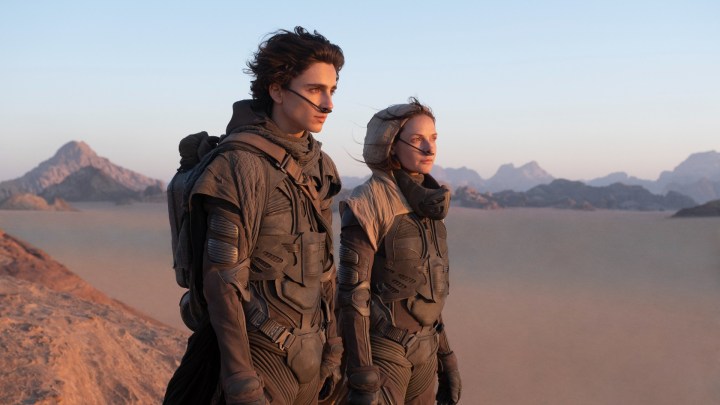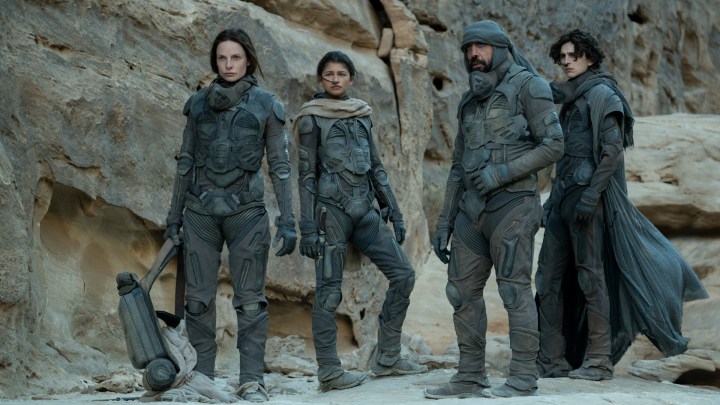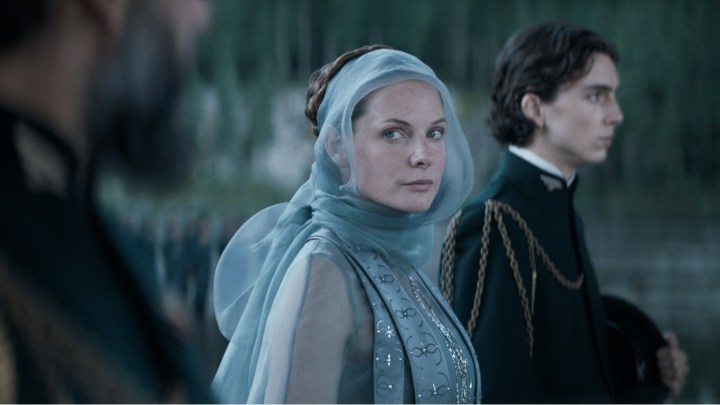Denis Villenueve over the past few years has quickly become one of Hollywood’s most reliably brilliant filmmakers, crafting one gorgeous, expertly shot movie after another that defies expectations and further solidifies his place among the best directors of his time. His latest, Dune, arrives with the highest level of hype so far (which is saying a lot for the director of Blade Runner 2049) and doesn’t do anything to endanger that trend — far from it, in fact.
An epic, meticulously envisioned film that delivers on every facet of its potential while teasing the promise of more to come, Villeneuve’s Dune makes a strong argument for being the best movie yet from one of the industry’s most talented directors.

Arrakis, revisited
Based on author Frank Herbert’s sci-fi classic of the same name, Dune is set in humanity’s far-flung future and casts Timothée Chalamet as Paul Atreides, the heir of House Atreides, one of several powerful noble families vying for control in a far-reaching galactic empire. When the Emperor assigns House Atreides control of the desert planet Arrakis, the only source of the most valuable resource in the universe that’s also necessary for interstellar travel, it ignites a series of events that endangers Paul’s family and threatens to dangerously shift the balance of power in the empire.
The second big-screen adaptation of Herbert’s Dune (following David Lynch’s polarizing 1984 film), Villeneuve’s movie is intended to be the first of a two-part saga making use of modern visual effects and the director’s own unique visual aesthetic to bring to life a world filled with fantastic technology, wielders of powerful mental abilities, and the ever-present threat of giant sandworms capable of swallowing an entire building. Along with Chalamet in the film’s lead role, the cast of Dune also includes a long list of similarly celebrated actors, including Rebecca Ferguson, Oscar Isaac, Josh Brolin, Dave Bautista, Zendaya, Jason Momoa, and Javier Bardem.
And yet, despite a crowded cast of high-profile actors and a story long considered impossible to adapt faithfully, Dune delivers on bringing the grand scale of its source material to bold, beautiful life on the screen, thanks to Villeneuve and the talented team he’s assembled both in front of, and behind, the camera.

Darkness and light
Dune is a tale filled with opposing elements, whether it’s the nobility and humanity of House Atreides challenged by the cruelty of their rivals, House Harkonnen, or the constant juxtaposition of the carefully controlled, industrial architecture of the cities built on Arrakis against the sweeping, ever-changing wild desert outside the cities’ walls.
No matter which elements are at play at any point in Dune, they’re handled with an expert’s deft touch. Villeneuve’s vision captures the contrasting elements that shape the world of Dune with the subtlety that makes each film he works on as impressive for its artistic achievement as its storytelling. His meticulous attention to detail is on full display, and the thoroughness of his world-building doesn’t waste any time drawing you in to an environment that seems as fully realized as (and perhaps more so than) the one you imagine while reading Herbert’s novel.
From the gritty prowling grounds of drug cartels in 2015’s Sicario to the neon, cyberpunk dystopias of Blade Runner 2049, Villeneuve has consistently offered audiences a ticket into worlds that are more than just backdrops. And Dune gives every grain of sand a sense of weight and every moment in the sun a sense of oppressive heat that makes Arrakis feels as unforgiving as the story demands. It’s a world where humanity shouldn’t thrive, and the film imparts that sense of unwelcomeness without any need for exposition.

Digging out the details
While Herbert’s novel relies heavily on inner monologue for substantial portions of the story, Villeneuve makes creative use of dreams and other narrative devices to accomplish the same feat in the film. It’s a technique that could have easily distracted from the more linear story being told and confused the audience, but Villeneuve and the film’s writing team do an excellent job of making these elements feel organic to everything else going on in the moment. That’s no easy task — as evidenced by the trail of failed adaptations leading up to this one — and it’s an element that works so well in Villeneuve’s Dune that a more faithful translation of the story would probably seem unnecessarily confusing now.
That willingness to explore alternate ways to tell the same, fundamental story is a key ingredient in the film’s success at making Dune‘s complicated — and yes, wonderfully weird at times — world not only more digestible, but also more visual. Thanks to the film’s talented cast, we don’t need to hear Paul grappling with some inner turmoil when we can see Chalamet bringing his angst, anger, and emotional arc to life with all of the skills that earned him an Oscar nomination already (for 2017’s Call Me By Your Name).
Like so many of his prior projects, Villeneuve’s knack for striking the right balance between what needs to be told or shown explicitly and understanding what he can rely on his actors — or art team — to convey keeps Dune rolling along at a brisk pace with little letdown in tone or tension. And there’s also little need to pause for explanation of Arrakis, the political implications of what’s occurring there, or the machinations of the empire itself. Trusting the audience to parse the information they need from the story you’re telling is always a gamble, and it’s one that pays off for the film’s lengthy 155-minute running time.

Hero’s journey
While there isn’t a bad performance to be found in Dune, Chalamet’s portrayal of Paul is the one that carried the most consequence for the film, and fortunately, the actor has no trouble with any of the heavy lifting the role requires of him.
Paul Atreides is yet another character shaped by duality. He’s a thoughtful, brilliant tactician well-suited — and well-groomed — to lead those around him. He’s also a character at war within himself, constantly struggling to reconcile the responsibility that comes with his powers and the destiny he’s constantly reminded of with his desire to be his own person and lead a life outside the formality and structure of his family line. He’s simultaneously reckless and regulated, conscientious and impulsive, and those qualities in conflict are part of what makes him so interesting as a protagonist.
Chalamet’s performance covers a wide range over the course of Dune, almost imperceptibly subtle when called for, and a raging cascade of action and emotion at other points. Villeneuve’s camera does a wonderful job of capturing all of it and putting the audience’s focus where it needs to be in each moment of Chalamet’s portrayal of Paul, and the synergy they have in Dune is the sort that raises individual examples of great acting and camera work to another level collectively.

Worth the wait
Herbert’s Dune was first published in 1965, and we’ve seen adaptation attempts come and go over the last five decades with varying levels of what could generously be called “success.” Some got the look right but never fully grasped the story, while others embraced the complexity of the story without devoting the necessary attention — or resources — to the fantastic world Herbert created. For fans of the novel (and the series it spawned), it’s been a mixed bag, so it’s no surprise that there hasn’t been a lot of optimism around potential Dune adaptations for a very, very long time.
With a history like that, it speaks volumes to Villeneuve’s achievement with Dune that the film’s scope, beauty, and execution come together in a way that makes all of those failed attempts and missed opportunities a little less frustrating. They can’t be that bad, after all, because those mistakes eventually led us — and Hollywood — to this moment, and this version of the film.
Ultimately, Villeneuve’s Dune is the adaptation of one of sci-fi’s greatest sagas that we’ve been waiting for all along.
Denis Villeneuve’s Dune will premiere in theaters October 22 and on HBO Max streaming service.



